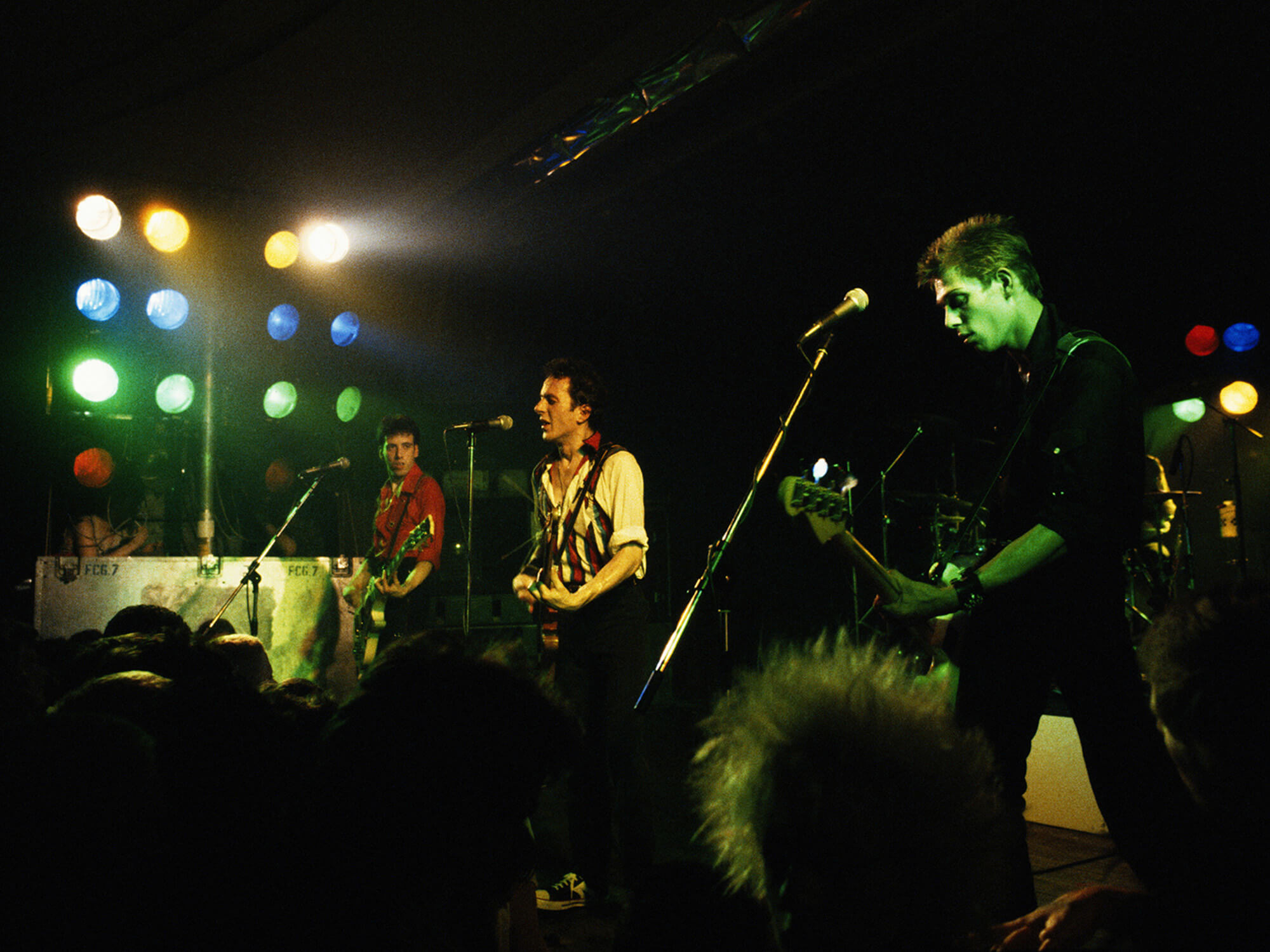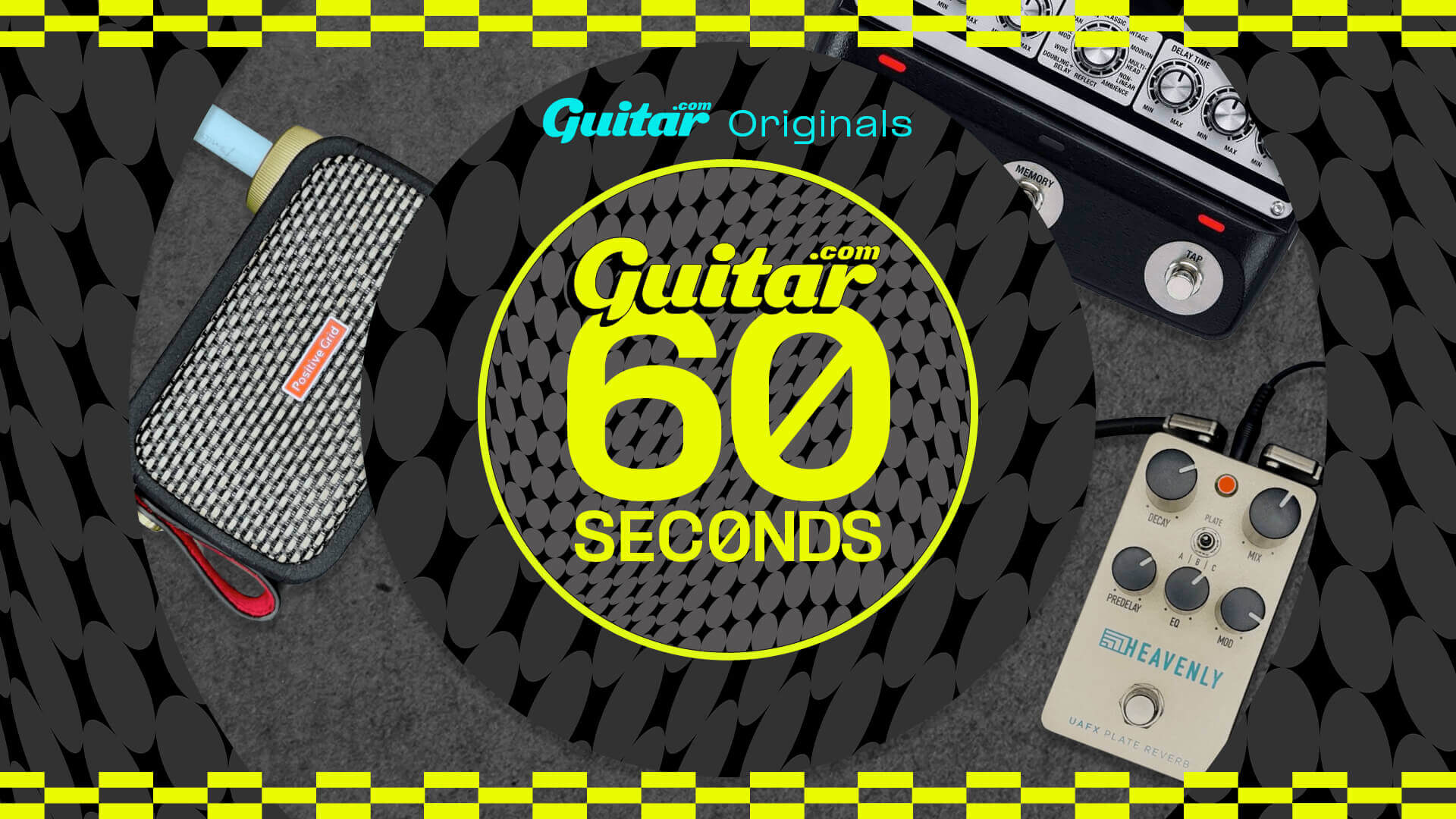The Gear Used by Joe Strummer and Mick Jones on The Clash’s ‘London Calling’
Released in December of 1979, The Clash’s ‘London Calling’ left an undeniable impression on rock history. Here’s the gear that Joe Strummer and Mick Jones used to make it.

(L-R) Mick Jones, Joe Strummer and Paul Simonon of The Clash performing in 1979. Image: Steve Morley/Redferns via Getty Images
The Clash’s landmark rock masterpiece London Calling was released in December of 1979 and left an incontrovertible impression on rock history. In its creation, the band recorded 19 songs during a six-week stretch at an old Victorian church hall that had been converted into a studio known as Wessex Sound Studios, which also hosted bands such as the Sex Pistols, The Rolling Stones, The Damned, and King Crimson.
The album was produced by Guy Stevens, whom the band has often lauded as a big part of the success of London Calling. Sadly, he would pass away from an overdose of prescription drugs less than two years after the album’s release.
London Calling remains a highly revered album in the annals of rock history, in this article, we’ll explore the straightforward gear setup responsible for the tones that, for many of us, shaped our musical upbringing.

The Guitars
For the recording of the iconic album, Joe Strummer primarily stuck with his 1966 Telecaster that would serve as his main instrument from the day he got it in 1975 until his passing in 2002. That guitar started off as a standard three-tone sunburst Tele but when The Clash was formed in 1976, the band’s manager, Bernie Rhodes insisted the band take measures to unify their on-stage appearance, as many bands of that era did. They took clothes and gear to an auto body shop to stencil and paint. It was there that Strummer’s Tele got the makeover we grew to know over the next few decades.
The guitar was painted black, and the word “NOISE” was stenciled onto the upper edge of the body, furthermore, stickers were added in typical punk fashion, including what most people describe as a Rasta flag and one that reads “Ignore Alien Orders”.
The guitar would see some further, more functional, alterations prior to the recording of London Calling, the stock ashtray bridge was converted to a six-saddle version and the tuners were allegedly upgraded to the newer F-style versions used by Fender in the early 70s, also a second-string tree was also added – all presumably to help the guitar endure the beatings it would get during live performances. More modifications would come in the future, but for the recording of London Calling, this was the state of the famous axe.

Some photographic evidence would suggest that Strummer may have also used a 1960 Esquire for the recording of some parts on London Calling – this guitar featured a racing stripe and a single bridge pickup. He certainly used it during the band’s live shows during that era, but we cannot confirm that it was used during the recording.
Unlike Strummer, his guitar wielding counterpart, Mick Jones implemented many guitars during the recording session – primarily relying on a collection of Gibson Les Pauls to counter Strummer’s Tele – the Tele-Les Paul combo has been used by many two-guitarist bands over the years. Jones’ stable of Les Pauls used on the album included a 1958 Standard Burst, a black 1965 Les Paul Custom, and two more Customs from the 70s in red and white finishes.
For at least part of the recording of the album’s title track, Jones used another Gibson model, an ES-295. Jones also reportedly used a Stratocaster from the late 1970s for several songs, most notably, Jimmy Jazz. All of these instruments were stock, as far as we know.

The Amps & Effects
As for amps, most sources claim that Strummer used a Fender Twin Reverb on the album – this was before he found the amp that would quickly become his favorite for the rest of his career, a Music Man 212-HD 130.
Jones on the other hand experimented a lot with amplifiers in the studio, favoring Mesa/Boogie combos, particularly the Mark I and Mark II, which he ran into a Marshall 4×12 cab. Jones also experimented with effects in the studio including many that somewhat defied the stripped down punk sounds that most of us think of when we think of the genre. Among them were a Roland RE-501 Chorus Echo unit (used on songs like Lost in the Supermarket), a Roland-201 Space Echo (on Train In Vain), and an MXR Phase 100 which was used on many songs across the album.
The Bass
The album’s cover depicts bassist Paul Simonon smashing his favorite Fender P-Bass – an image that has become somewhat of an archetype for the punk attitude. That photo was taken at a show on 21 September 1979, in New York. The recording of the album took place between August and November of that year. So it’s fair to assume that his favorite P-Bass was used for at least part of the album. As for what was used in the studio after he smashed the P-Bass, we aren’t completely sure.
We know he was seen using a hollow-bodied Epiphone Rivoli bass for the music video on London Calling and some suspect that was used on the album. But he also had a backup P-Bass that was lighter than the one he smashed. It seems very likely that this bass was used on the remainder of the recordings, through an Ampeg SVT.
Like with any band, the gear wasn’t always as important as how it was played, and Joe Strummer was a unique performer, even while in the studio, as engineer Bill Price explained in a 2000 interview with Chris Michie, the vocals and guitar were not separately tracked on the song Death or Glory,
“Joe’s more of an intuitive guitar player. He used to bash the living daylights out of his guitar when the song demanded it. He also had a sort of unconscious way of damping the chord with his right hand, which used to produce this incredibly urgent, clanging and clashing sound, which I’ve never heard any other guitarist ever produce. Joe always played a Fender, unless it was broken, and then he’d play anything. Joe’s strumming was so intrinsic to him that we used to do his vocals with him strumming an unplugged Fender, because it was the only way he could get into it. And if he didn’t have a guitar there for some reason, Joe would beat his chest with his right fist.”
London Calling lives on as one of the most acclaimed and beloved rock albums ever made.



